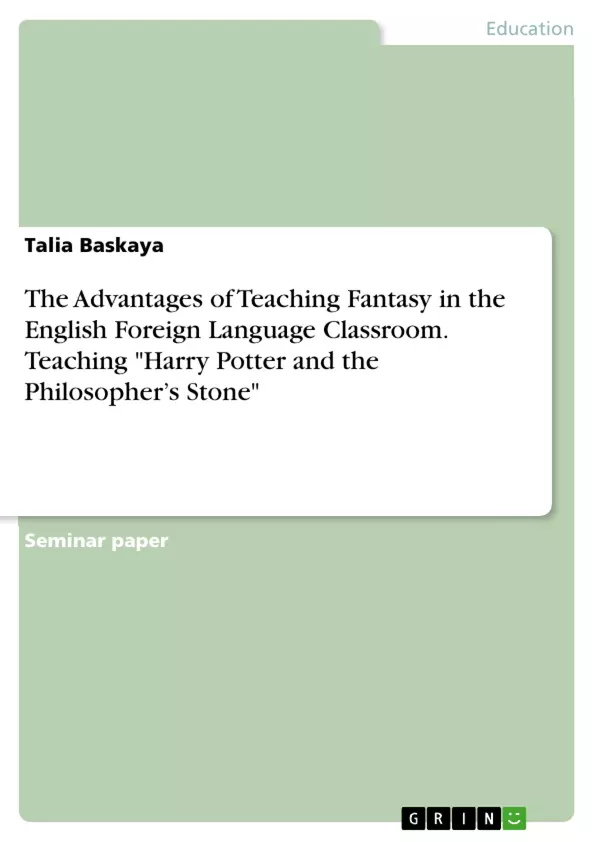In the following, the author is going to depict the benefits of working with fantasy literature in the in the English Foreign Language Classroom.
In the beginning, it is important to define the term "fantasy" as such correctly so you can evaluate its value for teaching English as a foreign language. Based on the definition of fantasy as theoretical background, the author is going to present the potential of fantasy literature and why it should be part of the curriculum. While doing so, hisfocus will be on Joanne Kathleen Rowling’s novel "Harry Potter and the Philosopher’s Stone" for which the author is going to delineate an analysis. Secondly, the aspects of the practical implementation will be considered until the final teaching unit will be presented.
The bottom line of this term paper should emphasize the importance of teaching fantasy literature in the EFLC by leaning on the works of noted philologists such as Ulf Abraham and authors as J.R.R. Tolkien or J.K. Rowling herself
Inhaltsverzeichnis (Table of Contents)
- Introduction
- Theoretical Background
- Defining the Term "Fantasy"
- Advantages of Teaching Fantasy Literature in the EFLC
- Harry Potter and the Philosopher's Stone: Analysis and teaching potential
- The Practical Implementation of Teaching Harry Potter and the Philosopher's Stone in the EFLC
- Conclusion
Zielsetzung und Themenschwerpunkte (Objectives and Key Themes)
This term paper aims to demonstrate the benefits of teaching fantasy literature in the English Foreign Language Classroom (EFLC) by focusing on the analysis and practical implementation of teaching J.K. Rowling's Harry Potter and the Philosopher's Stone. The paper will define the term "fantasy," explore the advantages of this genre in the EFLC, and present a detailed teaching unit for a sixth grade class.
- Defining the term "fantasy" and its characteristics
- Exploring the potential of fantasy literature in the EFLC
- Analyzing the teaching potential of Harry Potter and the Philosopher's Stone
- Developing and presenting a practical teaching unit for the novel
- Examining the impact of fantasy literature on student motivation and language acquisition
Zusammenfassung der Kapitel (Chapter Summaries)
The introduction highlights the increasing prevalence of fantasy literature in EFLC curricula and explores the contrasting viewpoints on its value. It establishes the paper's focus on demonstrating the benefits of teaching fantasy by analyzing Harry Potter and the Philosopher's Stone.
The theoretical background section defines the term "fantasy" and outlines its advantages in language learning. This section draws on various theories and research, including contributions from J.R.R. Tolkien, Ulf Abraham, and Wolfgang Ulrich Dressler.
The chapter on Harry Potter and the Philosopher's Stone analyzes the novel's potential for teaching English as a foreign language. This section delves into the specific features of the text, exploring how its content and structure can be leveraged for pedagogical purposes.
The chapter dedicated to the practical implementation of teaching Harry Potter and the Philosopher's Stone focuses on the development of a detailed teaching unit for a sixth grade class. It outlines the learning objectives, activities, and assessment strategies for each lesson.
Schlüsselwörter (Keywords)
The key terms and concepts explored in this paper include fantasy literature, EFLC, teaching potential, Harry Potter and the Philosopher's Stone, pedagogical strategies, student motivation, language acquisition, and the British Contextualism.
Frequently Asked Questions: Teaching Fantasy in the EFL Classroom
Why is fantasy literature beneficial for English foreign language learning?
Fantasy literature increases student motivation, encourages creative language use, and provides engaging cultural contexts that facilitate language acquisition.
What is the focus of the teaching unit for "Harry Potter and the Philosopher’s Stone"?
The unit is designed for a sixth-grade class, focusing on specific pedagogical strategies, learning objectives, and activities derived from J.K. Rowling's novel.
How is the term "fantasy" defined in this paper?
The paper defines fantasy based on the works of philologists like Ulf Abraham and authors like J.R.R. Tolkien to establish a theoretical background for its curriculum value.
What are the key themes explored in the Harry Potter analysis?
The analysis explores the novel's teaching potential, its structure, and how its content can be leveraged for pedagogical purposes in an EFL setting.
Who are the noted philologists mentioned in the study?
The study leans on the works of Ulf Abraham, J.R.R. Tolkien, and Wolfgang Ulrich Dressler to support the importance of fantasy in education.
- Quote paper
- Talia Baskaya (Author), 2016, The Advantages of Teaching Fantasy in the English Foreign Language Classroom. Teaching "Harry Potter and the Philosopher’s Stone", Munich, GRIN Verlag, https://www.hausarbeiten.de/document/513417


